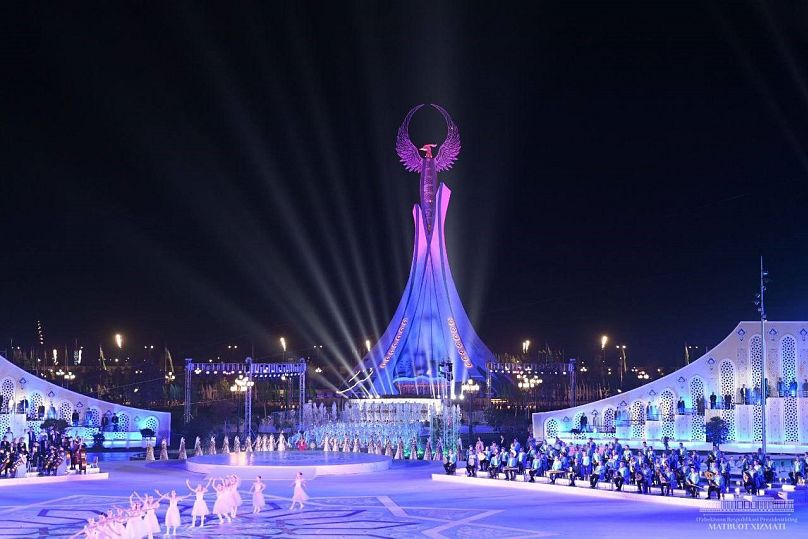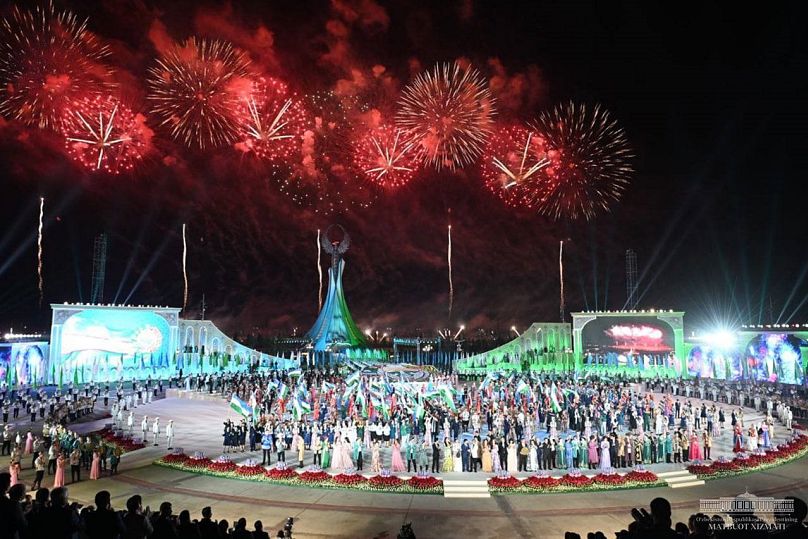With thousands of years of history behind them, one might well wonder why the citizens of Uzbekistan place so much stock in their annual celebration of independence, this year just 32 years on. It’s not just a day off with fireworks for the kids.
The nation’s very first Independence Day celebration, on Sept. 1, 1992, was a stunning evening festival in Tashkent, featuring hundreds of dancers, musicians and acrobats and a speech by then-President Islam Karimov.
If last year’s event is any indication, this year’s festivities will be no less lavish. Breaking away from the Soviet Union in 1991 was an historic achievement. But current President Shavkat Mirziyoyev will feel he and his nation have much to celebrate this year, including a new constitution, followed by the Presidential elections.
“Our creative people, now approaching 40 million, have a three-thousand-year history of statehood, [and] a rich and unique culture,” Mirziyoyev said in an address to parliament earlier this year. “We are all responsible for their destiny, future and prosperity. In this regard, maintaining and consolidating peace and stability in the country will continue to be our most important task.”
The new constitution, backed by a referendum on April 30, is the centerpiece of a set of modernizing reforms Mirziyoyev has initiated. While competitive democratic politics remain a work in progress, the new basic law is designed to cement the rule of law and to broaden human rights protections.
But it is in the economy that the most visible changes have taken place since Mirziyoyev entered office following Karimov’s death in 2016. The Independence Day festival will take place at the Yangi (“New” in Uzbek) Uzbekistan park on the outskirts of Tashkent, and “New Uzbekistan” is a rebranding applied to a swathe of changes that began almost immediately under the new president.
Privatization and deregulation are having a dramatic impact. Over the past year alone, 40,000 new small businesses were established, Mirziyoyev reported recently to an annual conference on entrepreneurship.
New investment protections, eased currency controls, lowered trade barriers, simplified taxation and other incentives have helped attract a record $10 billion in foreign investment for 2023. The objectives include reducing state involvement in the economy and raising GDP from the current $80 billion to twice that, to $4,000 per capita. The government has set as a policy aim the nation’s advancement to middle-income status in the world by the end of this decade.
However, Independence Day is also a reminder of some of the less pleasant legacies of the Soviet era. The Soviet reliance on Uzbekistan for cotton production turned the area into a vast cotton plantation, initially to replace cotton imports from the United States. This reliance on a monoculture with intensive irrigation needs all but killed off local fruit, vegetable and grains production. But it also had a devastating impact on the Uzbekistan environment, with the shrinking Aral Sea, once the fourth largest inland water body in the world, now a famous symbol of what environmental mismanagement can lead to. Desertification has become a pressing issue for the Mirziyoyev regime, prompting major efforts such as tree planting and other attempts to reinvigorate large tracts of land lost to sand.
There have been big changes introduced in the cotton industry itself, since Mirziyoyev became the President. The government eliminated child and forced labour deployment in the cotton industry. These achievements were recognised by the international community and a boycott on Uzbekistan’s cotton was lifted. And in and around the Aral Sea, the government is also implementing an enhanced program of development, including oil and gas exploration and privately-funded plans for a major iron ore mining and processing complex.
Soviet energy needs are also partly responsible for Uzbekistan’s over-reliance on natural gas -- and its current ongoing energy problems. Uzbekistan was, for many years, the Soviet Union’s “gas province,” with all exploration, development, pipelines and other infrastructure directed at getting maximum amounts of gas out of the ground and away to the Soviet industrial centers far to the west.
Harder to access oil was ignored in preference to the USSR’s “oil province,” neighbouring Kazakhstan. Many gas fields are nearing the end of their production lives, with the result that gas exports to China, which had been flourishing, have now been halted. Meanwhile an expensive effort is being made through private investment to develop 103 potential oil fields overlooked by the Soviet planners.
Long term under-investment in electricity production and transmission has led to recurring power outages in many parts of Uzbekistan, including Tashkent. The government is in a frenetic program of modernization and upgrading currently and has invited international investors to supplement conventional power production with solar and wind energy projects. Without these, the growth plans for the economy would be impossible.
As a consequence, the energy ministry has announced the opening of a new mini hydroelectric facility or upgrade to a substation on an almost daily basis.
In any event, nothing will be allowed to dim the mood -- or the lights -- on Independence Day.



